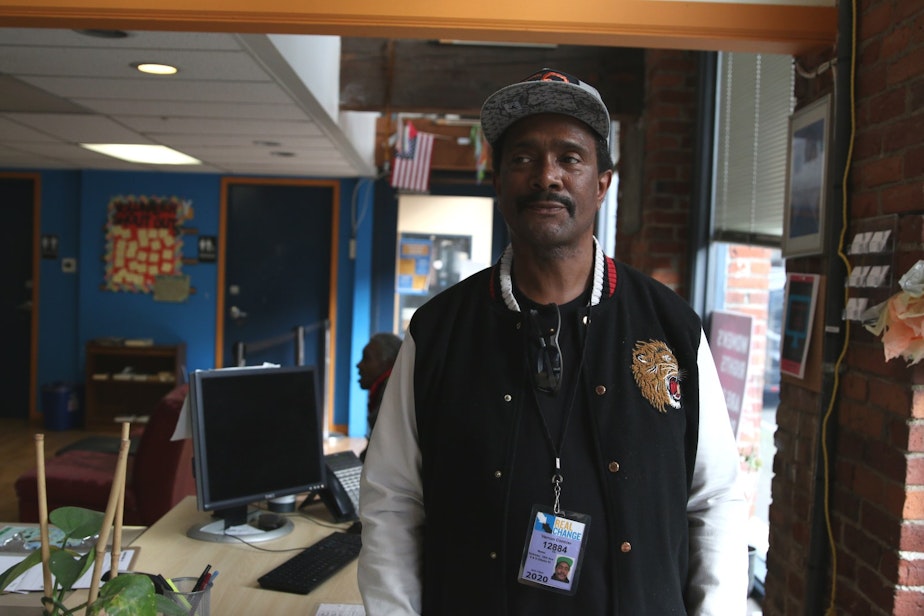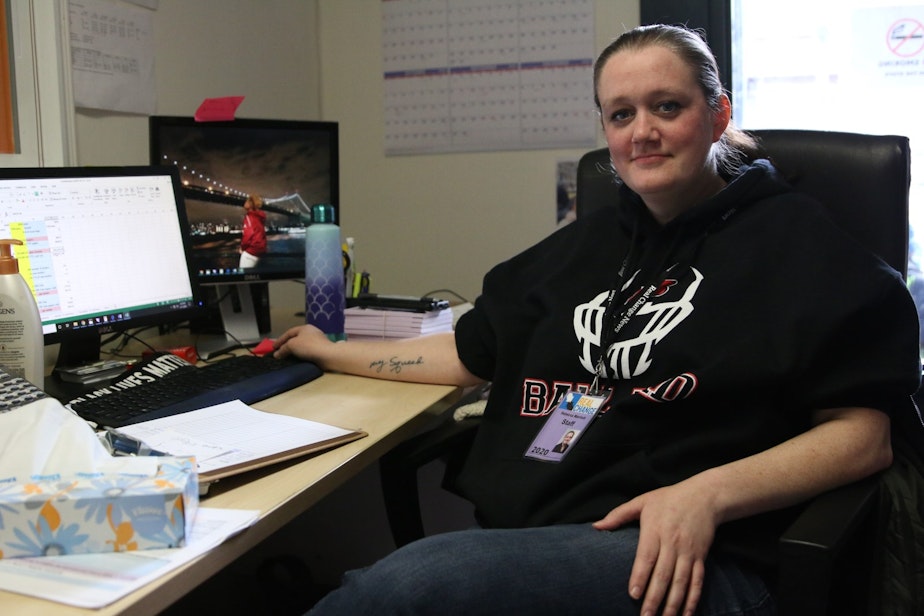Selling a homeless newspaper in the time of the coronavirus

The vendors that sell Real Change, the homeless newspaper, are getting hit by the economic fallout of the coronavirus. Newspaper sales are down due to social distancing. It's part of a larger trend: funds for non-profits are declining even as the need for services grows.
Isaac Metzker sells Real Change newspapers at 1st and Washington, in Pioneer Square. His regular customers don’t come around anymore.
“It’s like they see me, they just go right around the block, they go around that block," said Metzker. "It’s like they’re afraid they’re gonna catch it from us.”
The distrust goes both ways. When a customer approaches vendor Vernon Cormier, this is what goes through his head: “Do they got it? Am I going to catch it from this specific one? So I’m kind of standoffish, too," he says. "I’m kind of a little panicky too.”

Many of the people are homeless or formerly homeless. They rely on the money from paper sales to help them stay sheltered and pay for necessities. For Cormier, it’s toilet paper and tennis shoes. For Metzger, it helps him pay $5.00 a night for a bed at the Bread of Life Mission. But with both their sales way down, they’re afraid they might have to go without.
Sponsored
Still, some vendors are doing just fine. Vendor David Canada Jones has kept his sales up – by passing out tiny bottles of hand sanitizer. “As you can see, I collect them,” he says, reaching into his backpack. The bottles are given out free at meals for the homeless. He saves them, and offers them to Real Change customers as they stream off the ferries into downtown.

“Some people don’t take the paper, they just take the sanitizer, and some people don’t take the sanitizer, they just take the paper, and they even out," he says. "And I want to give back because I don’t want nobody sick.”
Overall, vendor sales of Real Change are down about 20%. That average hides the fact that vendors are suffering unequally and some are really hurting.
Vendor manager Rebecca Marriott is trying to figure out ways to help the ones who are falling behind. “One of the things we are really encouraging folks to do is to use Venmo, to support their vendor.” That’s a way to send someone money electronically so nobody has to get too close to anybody.
Sponsored

And Real Change has dropped the price it charges vendors for the paper – from 60 cents to 50 cents.
It’s also offering plastic gloves to vendors who ask for them. About 1 in 3 ask, Marriott says.
Vendor Vernon Cormier has found the gloves help with sales a little. “It helps people feel safe, you know," he says. "Makes me feel safe.”
But non profits in general - are not feeling safe right now. Xochitl Maykovich is the political director of Washington CAN, a coalition of community organizations that form part of the economic safety net for many people. She said what’s happening at Real Change is only the beginning. “Well, I’m unfortunately not surprised given what’s going on," she says, "but I am honestly terrified by what’s gonna happen in the next couple weeks.”
Sponsored

The mandates against big gatherings – mean that some non profits can’t hold their big annual fundraisers. Meanwhile, she says it’s not just Real Change vendors, but also Uber drivers and restaurant workers and many other workers. They’re are all going to need help at the same time. “And I think it’s really going to put a lot of pressure on the system," she says. "And we’re going to need this city, county and the state to be willing to put in a lot of money.”
State, county and city Governments are raising money, tapping rainy day funds and budget stabilization accounts. But officials say more will be needed.
Real Change vendor David Canada Jones, the guy with the Purell bottles, has some advice for everybody trying to find their way through this.
“Apply yourself unto the situation, whatever it is. If it’s raining, you get an umbrella. Improvising, is what it’s called. If your shoe's untied, untie the other shoe! Stay safe. Stay right,” he says.
During the coronavirus outbreak, KUOW Reporter Joshua McNichols is looking for stories on how the virus is hitting vulnerable communities. If you have a story tip, write him at jmcnichols@kuow.org or via direct message on Twitter @joshuamcnichols .




